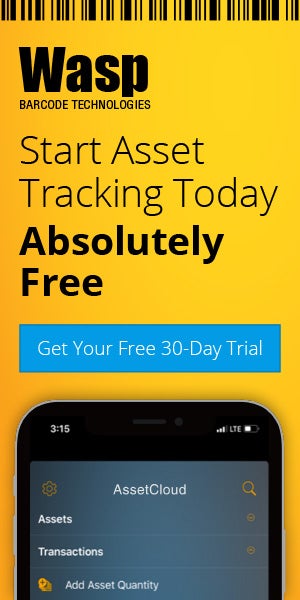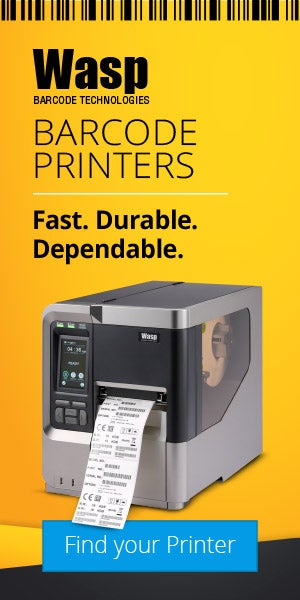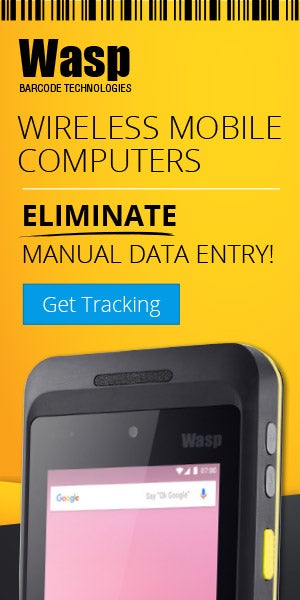Wasp Barcode Technologies: The Barcode Solution People
How To Enjoy the Holidays Even If You're A Small Business Owner

Small business owners know that there’s really no such thing as a vacation. Especially in the first months and even years of the life of the business, it can feel like every day is make-or-break, and requires your presence and attention.
But while you work hard to make ends meet, to strengthen your supply chain, to find the best deals on inventory, to respond to your customers, the pages of the calendar keep turning and you’ll inevitably find yourself pulled away from your business by the call of the holidays. Family and friends want to see you, and perhaps you want to see them, too—or just to take some time off, to enjoy the fruits of your labor.
Yet that’s rarely what happens. According to a
Funding Circle survey, half of small business owners say they’ll take less than three days off during the holidays, and almost 70 percent say they won’t even really be “off” those days—that they’ll work a bit, or check email.
So how can small business owners enjoy the holidays, when for many this time of the year is the most important of all?
There are many possibilities here, but one answer stands out above the rest: You need things to be automated.
Many small businesses, depending on their size and age, use automated processes in some capacity. And yet, even in 2017, many don’t:
According to the Wasp Barcode State of Small Business Report, 43 percent of small businesses don’t track their inventory or use a manual process, and 55 percent of small businesses don’t track fixed assets or use a manual process.
Let’s first tackle why these two areas are ripe for optimization and can be a major help in allowing you to at least take a day or two off.
Why Inventory Management Should Be Automated
Inventory operations should be automated even when you’re in the office. But when you’re on vacation, they typically handle jobs that would otherwise stop your company in its tracks if unattended.
Inventory management software can reorder inventory once their levels get too low, preventing stock outs—which can be a momentum killer come holiday time. (If you run a service-oriented company rather than sell a product, you’ll still want to track the materials used, such as cleaning supplies.)

You can safely sell your products across multiple channels—such as your own website, Shopify or Etsy platform, or Amazon Marketplace—without fear of overextending yourself and promising items you can’t deliver in time for Christmas.
You’ll shorten your lead time (the time it takes for a supplier to deliver your goods), which is critical within a time frame where there may be an incredible run on your products very quickly.
And you’ll have a balanced inventory turnover ratio. In the past, you might have planned for the holidays by just buying tons of stock and hoping (or expecting) to sell it all. But what happens if you don’t? What happens if the holiday season ends and you’re left with excess inventory that takes up space on warehouse shelves, deteriorating in quality, needing to be sold at a discount or loss? Instead, keep your ratio balanced and only buy more stock when you need to, saving yourself money in the short and long term.
Why Your Asset Management Should Be Automated
Fixed assets are the machines and programs your company invests in to help turn a profit. That can mean vehicles, computers, manufacturing equipment, or subscription-based software.
[Tweet "Fixed assets are the machines and programs your company invests in to help turn a profit."]
With fixed asset management, machines are tracked to maintain their optimal level of performance. Routine maintenance is scheduled and reminders are sent to ensure they don’t miss a check-up. They are automatically depreciated on your ledgers so you’re not paying too much (or too little) in taxes for them every year.
These operations are especially critical during the holidays, when you might be out of town, or when max capacity is needed. The last thing you need is for a machine crucial to the production of your income to break down because you pulled a piece from it to fix another machine, or because you skipped regular maintenance.
The same goes for subscription-based software that might handle your website hosting, or design programs, or accounting. If free trials dry up, or your credit card expires, or something else gets in the way of your programs running smoothly, your employees may have little to no idea how to get them back online. Check to see that nothing is set to expire while you’re away, and leave instructions on how to handle things if they do.
The best part about both inventory and asset management systems is that, if they are cloud-based, you should be able to connect to and monitor them from any place with internet. So if you are going to take a vacation, but want the flexibility of checking in on things from time to time, you’ll have the same real-time visibility that you would in the office.

What Else Should Be Automated?
One overlooked area is that of the out-of-office away message in your email. You can direct people to every and any department using a directory of links, as well as to specific people who can handle their request straight away.
You can also
use applications to link together your various programs—such as Google Drive, Slack, Basecamp, Trello, MailChimp, Salesforce, Facebook, and so on—and automate your work processes, creating a cascade. That way, you’ll reduce the busy work you typically do around the office, and you’ll have a leg up on servicing clients that reach out to you while you’re away.
Also consider scheduling posts on your social media page to keep your feeds active during the holidays. Use a platform like Hootsuite to send out tweets about sales, promotions, and holiday wishes to followers, and it’ll seem like business as usual, even if it’s not.
What Shouldn’t Be Automated
If you’re a solo operation, you’ll clearly need to ramp down business if you plan to take a break, or pass things off to someone else. But if you have employees working under you that will shoulder the load, it’s important to have real interactions with them and allow them to take responsibility for handling operations. Let them take the reins, don’t just give them a view to what could potentially be catastrophic errors.
Have meetings with your employees beforehand to go over best practices and what to do in emergencies. (Also, have a post-mortem with them to see what worked well and what could be improved for next time.) Allow them to practice running the show while you’re still on hand to make suggestions and improvements. And give trusted employees access to the things they’ll need to safeguard your business, such as passwords for security systems.
Introduce employees personally to important clients by phone or email and explain that they’ll be the point of contact for the time you’re gone. Transparency is important in these situations: Clients and customers will feel more at ease if they know the score.
Essentially, allow your human capital to do what they do best: be human. Give them the capacity to make tough decisions, flex their creativity, and continue to grow the business in your brief absence. That will never happen if you don’t allow it.
And hey, if you need to, for your own piece of mind: Give people access to your personal email or phone so they can get in touch if absolutely necessary. That beach isn’t going anywhere—you can take a few minutes to sort things out if you need to.
Holidays and small business don’t mix. But you didn’t give up your humanity to make money: Plan ahead by automating what you can, organizing and optimizing the things you can’t, and hope for the best. If you invest in the right systems and people, everything should be just fine when you return.
 Small business owners know that there’s really no such thing as a vacation. Especially in the first months and even years of the life of the business, it can feel like every day is make-or-break, and requires your presence and attention.
But while you work hard to make ends meet, to strengthen your supply chain, to find the best deals on inventory, to respond to your customers, the pages of the calendar keep turning and you’ll inevitably find yourself pulled away from your business by the call of the holidays. Family and friends want to see you, and perhaps you want to see them, too—or just to take some time off, to enjoy the fruits of your labor.
Yet that’s rarely what happens. According to a
Small business owners know that there’s really no such thing as a vacation. Especially in the first months and even years of the life of the business, it can feel like every day is make-or-break, and requires your presence and attention.
But while you work hard to make ends meet, to strengthen your supply chain, to find the best deals on inventory, to respond to your customers, the pages of the calendar keep turning and you’ll inevitably find yourself pulled away from your business by the call of the holidays. Family and friends want to see you, and perhaps you want to see them, too—or just to take some time off, to enjoy the fruits of your labor.
Yet that’s rarely what happens. According to a  You can safely sell your products across multiple channels—such as your own website, Shopify or Etsy platform, or Amazon Marketplace—without fear of overextending yourself and promising items you can’t deliver in time for Christmas.
You’ll shorten your lead time (the time it takes for a supplier to deliver your goods), which is critical within a time frame where there may be an incredible run on your products very quickly.
And you’ll have a balanced inventory turnover ratio. In the past, you might have planned for the holidays by just buying tons of stock and hoping (or expecting) to sell it all. But what happens if you don’t? What happens if the holiday season ends and you’re left with excess inventory that takes up space on warehouse shelves, deteriorating in quality, needing to be sold at a discount or loss? Instead, keep your ratio balanced and only buy more stock when you need to, saving yourself money in the short and long term.
You can safely sell your products across multiple channels—such as your own website, Shopify or Etsy platform, or Amazon Marketplace—without fear of overextending yourself and promising items you can’t deliver in time for Christmas.
You’ll shorten your lead time (the time it takes for a supplier to deliver your goods), which is critical within a time frame where there may be an incredible run on your products very quickly.
And you’ll have a balanced inventory turnover ratio. In the past, you might have planned for the holidays by just buying tons of stock and hoping (or expecting) to sell it all. But what happens if you don’t? What happens if the holiday season ends and you’re left with excess inventory that takes up space on warehouse shelves, deteriorating in quality, needing to be sold at a discount or loss? Instead, keep your ratio balanced and only buy more stock when you need to, saving yourself money in the short and long term.



